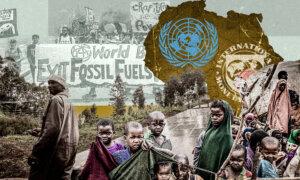A new report from the Fraser Institute has cast doubt on claims that extreme weather events are becoming more common, arguing such assertions by governments and media outlets are not “iron-clad.”
“Many types of extreme weather show no signs of increasing and in some cases are decreasing ... Claims about extreme weather should not be used as the basis for committing to long-term regulatory regimes that will hurt current Canadian standards of living, and leave future generations worse off,” reads the April 18 report, “Extreme Weather and Climate Change.”
The report warns that based on assertions that have not been proven to be true, governments have been enacting “ever more restrictive regulations” on Canadian consumers of energy products, which have imposed costs on Canada’s economy and its citizens’ standards of living.
The authors also raise concerns that world leaders are using “extraordinary claims” about the earth’s climate to justify actions that would lower standards of living, such as abandoning capitalism and doing away with fossil fuels. It adds that these two developments led to humans shifting away from manual labour in agriculture, developing technologies to enable longer life spans and reduced infant mortality, and implementing democracies.
“Truly extraordinary claims to action,” the report says of fossil fuels and capitalism. “Is there, correspondingly, extraordinary evidence to back up the claim that climate change is so severe, and growing still more severe that such extraordinary actions are justifiable or warranted?”
Analyzing Claims Around Extreme Weather Events
The report does not argue against the United Nations Intergovernmental Panel on Climate Change’s (IPCC) claims that the earth has been warming since the 1950s, calling the assessment “widely accepted to accurately reflect reality.” But it takes issue with claims that extreme weather events such as floods, hurricanes, droughts, and wildfires have been happening more.
While the IPCC asserts medium confidence that there has been some increase in fire weather in “some regions” since 1950, the report claims that data has shown no clear trend in increasing number or intensity. It adds that in Canada, wildfires have been decreasing in number and size from the 1950s to the present.
The report does not include data from 2023, when Canada had its most destructive wildfire season in recent history at 18.4 million hectares burnt compared to the 10-year average of 2.5 million. The federal government blamed the destructive wildfire season on climate change, with Prime Minister Justin Trudeau claiming in a post on X that Canada was seeing “more and more of these fires because of climate change.”
When it came to droughts, the report pointed out that the IPCC has “medium confidence” that their numbers are increasing, and called the underlying evidence for such claims “clearly mixed and inconsistent.” It also cites a 2021 International Energy Agency report that suggested the drought severity in Canada from 2000 to 2020 was only slightly above the global average.
While the report notes IPCC claims it is “likely” floods have increased since 1950, it notes that trends show a “high regional variability and lack overall statistical significance of a decrease or an increase over the globe as a whole.” It also cites “Canada’s Changing Climate Report,” which found there did not appear to be “detectable trends in short-duration extreme precipitation in Canada for the country as a whole.”
For hurricanes, tornadoes, and cyclones, the report acknowledges the IPCC suggests there is likely an increase in certain tropical cyclone characteristics. But it said evidence that hurricanes or cyclones are growing more frequent or are caused by human activities “either contradicts the IPCC’s narrative, or reveals no trends in the data.”














 English (US) ·
English (US) ·  Turkish (TR) ·
Turkish (TR) ·